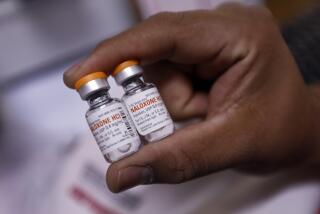Clinics to give away asthma inhalers
Community health clinics throughout California will begin giving away environmentally friendly asthma inhalers this week to uninsured and low-income patients facing a federal ban on older inhalers that use an ozone-depleting propellent.
After next year, pharmacies will no longer dispense inhalers that use chlorofluorocarbons, or CFCs. In 1985, scientists discovered that CFCs were causing a hole or thinning in the ozone layer, a gaseous band in the stratosphere that shields Earth from harmful radiation.
In 1987, the United States signed an international treaty to eliminate the production and use of ozone-damaging chemicals. The American Lung Assn. and other health groups lobbied to exempt inhalers long enough to give manufactures time to develop new devices and patients time to make the switch.
Asthma inhalers dispense a prescription drug called albuterol, which quickly relaxes and opens airways during an asthma attack. The new inhalers use hydrofluoroalkane, or HFA, to propel albuterol to the lungs.
More than 2.8 million Californians have asthma, and about 370,000 of them lack health insurance, according to the UCLA Center for Health Policy Research. Asthma causes 12,000 hospitalizations annually in Los Angeles County and more missed school days than any other chronic condition. According to the U.S. Centers for Disease Control and Prevention, one in four emergency room visits nationwide is for asthma.
Minority and low-income populations are particularly hard hit, probably as a result of genetic and environmental factors. Exposure to indoor and outdoor air pollution, including diesel exhaust, increases respiratory problems.
The pharmaceutical company Schering-Plough is donating 500,000 of its inhalers to 850 health clinics across the country, including more than 100 in California. Otherwise, an environmentally friendly inhaler costs $30 to $60, compared with $5 to $25 for a generic version of the old inhaler. The plastic canister and mouthpiece are reusable.
Barbara Pulley, executive vice president of QueensCare, which operates six Los Angeles-area clinics, said healthcare providers are expecting a run on the new inhalers as the deadline draws nearer. In addition to helping on costs, the donation will help clinics meet the demand, she said.
“For most of our patients, just to get a prescription to get their medication is enough of a challenge, without supply issues,” she said.
Direct Relief International -- a Santa Barbara philanthropy better known for delivering medical aid to developing countries -- handled the logistics of getting the inhalers from Schering-Plough to the clinics.
Participants include the Venice Family Clinic, Valley Community Clinic in North Hollywood, Harbor Community Clinic in San Pedro, South Central Family Health Center and Glendale Community Free Clinic.
More to Read
Sign up for Essential California
The most important California stories and recommendations in your inbox every morning.
You may occasionally receive promotional content from the Los Angeles Times.









